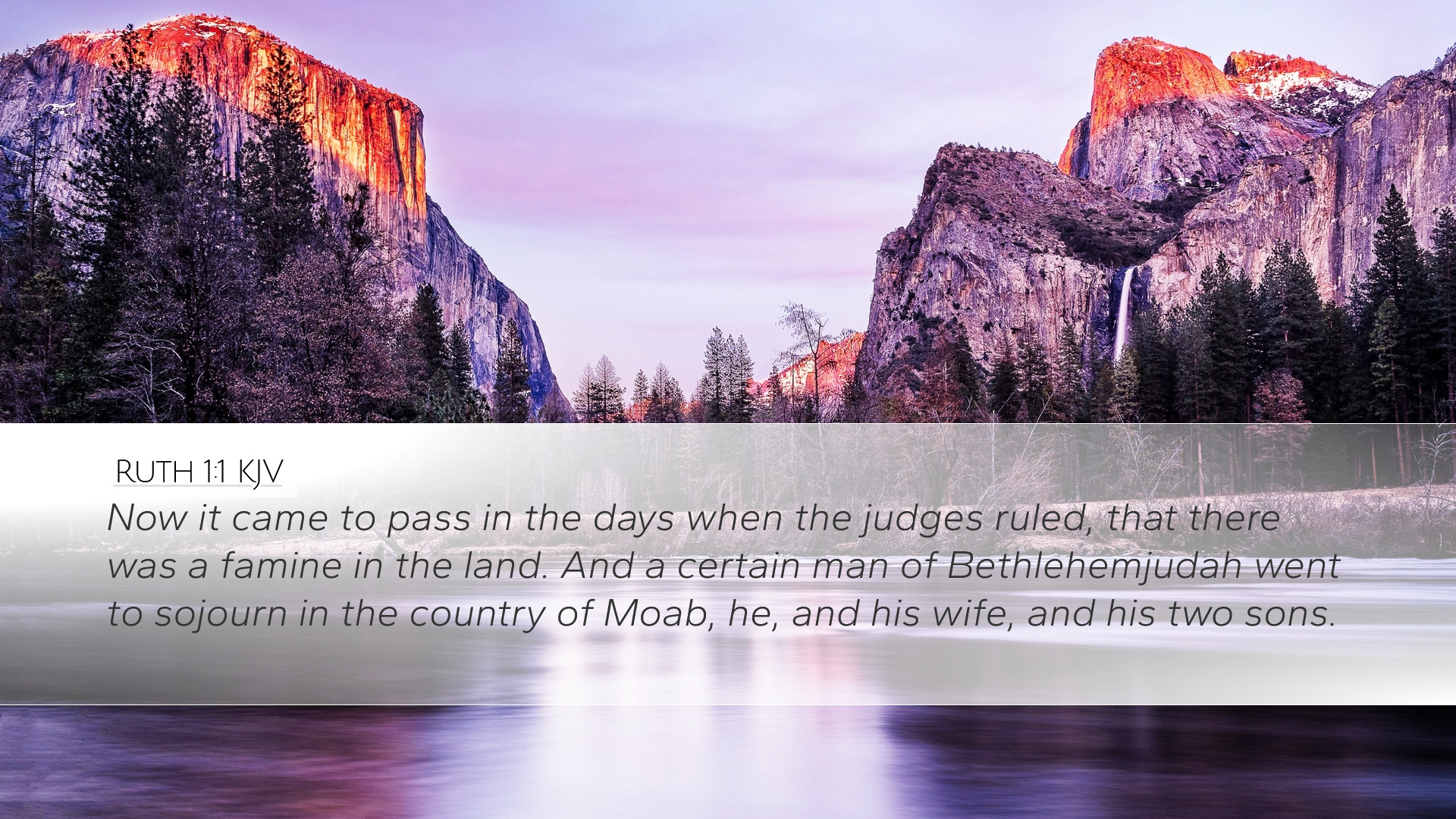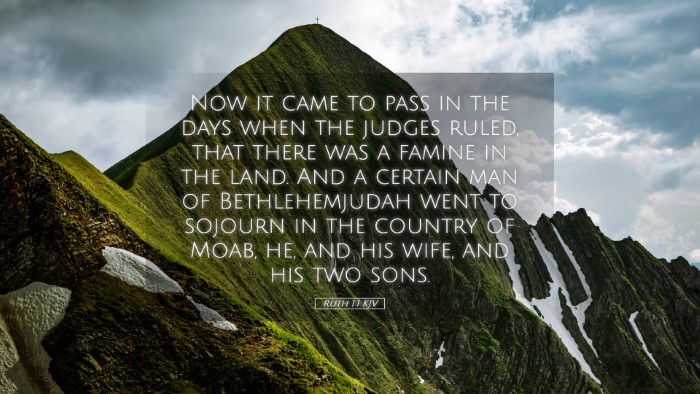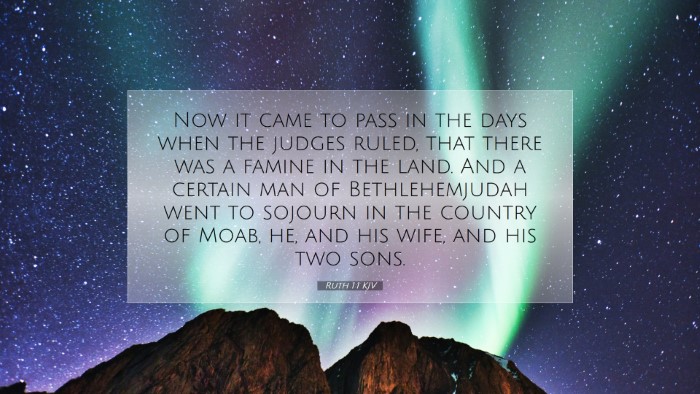Old Testament
Genesis Exodus Leviticus Numbers Deuteronomy Joshua Judges Ruth 1 Samuel 2 Samuel 1 Kings 2 Kings 1 Chronicles 2 Chronicles Ezra Nehemiah Esther Job Psalms Proverbs Ecclesiastes Song of Solomon Isaiah Jeremiah Lamentations Ezekiel Daniel Hosea Joel Amos Obadiah Jonah Micah Nahum Habakkuk Zephaniah Haggai Zechariah MalachiRuth 1:1
Ruth 1:1 KJV
Now it came to pass in the days when the judges ruled, that there was a famine in the land. And a certain man of Bethlehemjudah went to sojourn in the country of Moab, he, and his wife, and his two sons.
Ruth 1:1 Bible Commentary
Commentary on Ruth 1:1
Verse: "Now it came to pass in the days when the judges ruled, that there was a famine in the land. And a certain man of Bethlehem, Judah, went to sojourn in the country of Moab, he, and his wife, and his two sons."
Introduction
The opening verse of the Book of Ruth sets the stage for a narrative rich with themes of loyalty, providence, and redemption. It captures a pivotal moment in Israel's history during the time of the judges, a period characterized by turmoil and moral decay. This commentary will explore the implications of the social and spiritual circumstances surrounding this verse by drawing insights from esteemed public domain commentaries, which will be particularly beneficial for pastors, scholars, and students of the Bible.
Contextual Background
According to Albert Barnes, the mention of "the days when the judges ruled" indicates a time of spiritual disarray in Israel. This epoch was marked by a cyclical pattern of sin, oppression, crying out to God, and deliverance, leading to an unstable societal environment. Such a backdrop highlights the dire situation which prompts the characters' actions in Ruth 1:1.
- Moral Condition: The phrase "there was a famine in the land" symbolizes not only a physical scarcity but also an indication of God's judgment against Israel for their disobedience.
- Geographical Significance: Bethlehem, meaning "house of bread," presents a stark contrast to the famine that drives Elimelech and his family away from their homeland.
- Family Dynamics: The emphasis on Elimelech, his wife Naomi, and their two sons establishes the family unit as central to the unfolding narrative of redemption.
Exegesis of Key Themes
The Role of Providence
Adam Clarke remarks on the significance of Elimelech's decision to leave Bethlehem for Moab amidst the famine. While the act of leaving one's homeland for sustenance may seem practical, it also raises questions about trust in God's provision. The author's choice to juxtapose God's judgments in Israel with Elimelech's migration suggests that faithfulness to God’s covenant is paramount, even in the face of dire circumstances.
Human Agency and Divine Sovereignty
The choice made by Elimelech can be interpreted through the lens of Matthew Henry's exploration of free will versus divine decree. Although Elimelech decides to seek refuge in Moab, it is imperative to recognize that God remains sovereign over all events. The decisions made by human beings have immediate consequences within the grand tapestry of God’s overarching plan. Thus, Elimelech’s journey leads to key events crucial for God's redemptive plan, even amidst adversity.
The Significance of Moab
The decision to sojourn in Moab is laden with implications. As Barnes points out, the Moabites were traditionally viewed with disdain by the Israelites due to historical hostilities. This act of seeking refuge in a foreign land raises theological and moral questions about faithfulness and compromise. Herein lies the tension between immediate survival and long-term fidelity to God's covenant with Israel.
- Social Implications: Why did Elimelech not seek refuge among the Israelites in a neighboring region?
- Cultural Contrast: Moab presents both refuge and danger, contrasting Yahweh’s people with those who worshipped other gods.
Theological Themes
Theologically, Ruth 1:1 introduces motifs of suffering, loss, and divine faithfulness. The famine serves as a vivid reminder of God's disciplinary action against His people but also sets the stage for acts of grace and redemption that emerge later in the narrative.
Applications for Contemporary Believers
The observations gleaned from Ruth 1:1 can serve to encourage and challenge contemporary believers:
- Trust in God's Provision: Even in times of scarcity, believers are reminded to remain steadfast in faith, trusting that God will provide according to His will.
- The Importance of Roots: The question of leaving one’s homeland can prompt reflection on the significance of one’s spiritual heritage and the potential consequences of abandoning it.
- Living in Tension: The faithful believer often faces the challenge of navigating a world that contradicts their values, reminiscent of Elimelech's dilemma.
Conclusion
Ruth 1:1 encapsulates a complex interplay of divine providence, human choice, and the need for unwavering faith amidst crisis. By examining the context through the lenses of various commentators, we gain a deeper appreciation for the narrative that unfolds in the Book of Ruth. Each layer of this commentary peels back the richness of the text and offers insights applicable to the faith journey of contemporary believers.


